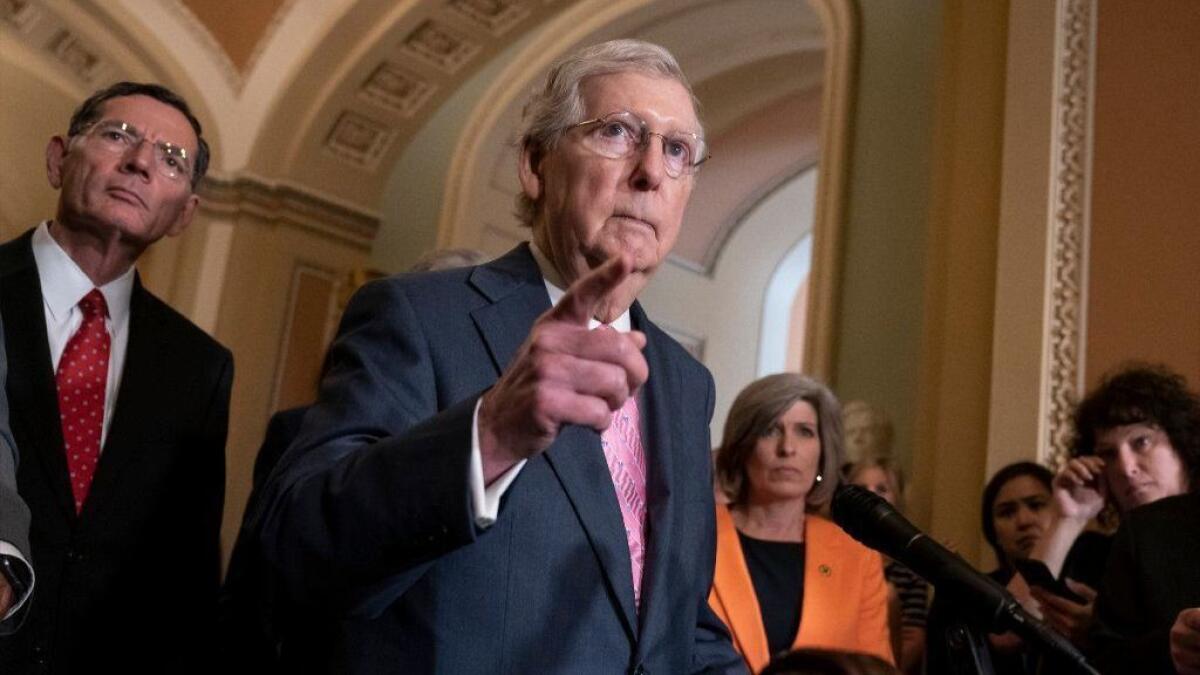House-Senate standoff puts border crisis money in jeopardy

- Share via
Reporting from Washington — House Democrats and Senate Republicans have dug themselves into a standoff over funding to respond to the crisis at the southern border, raising the possibility that new money will not be approved before lawmakers leave for next week’s Fourth of July recess.
Senate Republicans on Wednesday voted down the House version of a funding bill, with Majority Leader Mitch McConnell accusing House Democrats of doing nothing but “resistance theater.”
The bill failed 37-55, with seven Democratic presidential contenders missing the vote ahead of the 2020 presidential debate in Florida on Wednesday and Thursday nights.
Instead, the Senate approved its own bill with overwhelming bipartisan support: 84-8.
Politicians in both parties say the federal government needs additional funding to house and care for migrants crossing the border. Several lawmakers said Wednesday they wanted to get the dispute resolved quickly to prevent funding from running out, which would happen on Sunday.
They also want to avoid the political optics of appearing at Fourth of July parades back home while people are suffering at the border.
But so far, there is little appetite for compromise. The crisis was thrown into stark relief this week with a photo of the drowned bodies of a man and his young daughter, who died while trying to enter the United States.
Speaker Nancy Pelosi (D-San Francisco) and President Trump spoke by phone midday Wednesday to attempt to reconcile the bills, according to a senior Democratic aide. Senate Minority Leader Charles E. Schumer (D-N.Y.) said Pelosi wanted four changes made to the Senate bill. He told reporters the new text involved “basic checks” so that the Department of Homeland Security “doesn’t do the kind of things that no one wants to see them do.”
The House will try to take up an amended version of the Senate bill on Thursday. The legislation would mandate that the funding can only be used for the purposes set in the bill and it would set minimum care standards, among other requirements.
It is not known if progressive Democrats would back the bill, and it is unclear whether the White House — which favors the Senate bill — would support the new House-backed provisions.
The competing bills both have about $4.5 billion in humanitarian aid — the vast majority going to the Department of Health and Human Services, not to law enforcement agencies.
But the bills have differences. The House bill sets minimum standards for the care the federal government has to provide to people in its custody and other projects, such as funding for small, quickly deployable shelters and a pilot project based on a United Nations model for refugees.
In the House, Democrats held out hope that Pelosi would be able to strike a compromise between the chambers. A key issue was whether money could be used for enforcement of Trump’s immigration polices.
“We have a deep mistrust of the administration. We can all rally around the need for this humanitarian money and that it shouldn’t be redirected,” said Rep. Veronica Escobar (D-Texas). Without the protections that she wants added to the Senate bill, “it would be giving the president a blank check. I don’t trust him in the least to deliver the money where it needs to go.”
The House bill was approved Tuesday night, 230 to 195, largely along partisan lines. Three moderate Republicans joined Democrats in support, and four progressive Democrats joined Republicans in opposition, saying the bill didn’t go far enough.
Rep. Alexandria Ocasio-Cortez (D-N.Y.), one of the Democrats who opposed the House bill, warned that the Senate bill would allow facilities that housed people to continue to get funding even if they didn’t meet minimum standards of care.
“Make no mistake, the Senate bill is not a humanitarian bill,” she said. “They’re trying to speak as such, but the Senate bill is not a humanitarian bill by any stretch of the imagination. There is no accountability.”
Senate Democrats defended their bill, arguing that they weren’t able to add similar language because of objections from Republicans. The White House had warned that such language would hamstring administration border security operations.
Senate Republicans, who have the support of the White House on their bill, say the failure of the House bill in the Senate should prove to the lower chamber that they need to accept the Senate version.
“We’re just demonstrating to them that their bill doesn’t have support in the Senate,” said Sen. John Cornyn (R-Texas). “They can reach their own conclusions.”
More to Read
Get the L.A. Times Politics newsletter
Deeply reported insights into legislation, politics and policy from Sacramento, Washington and beyond. In your inbox twice per week.
You may occasionally receive promotional content from the Los Angeles Times.











